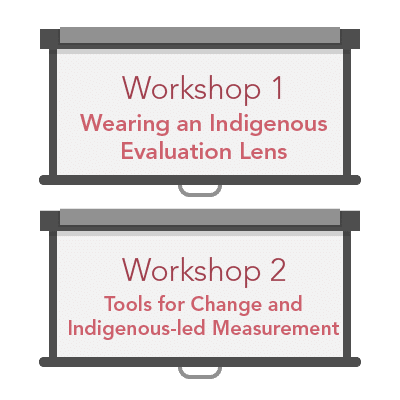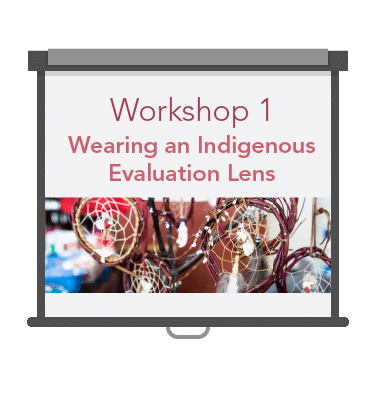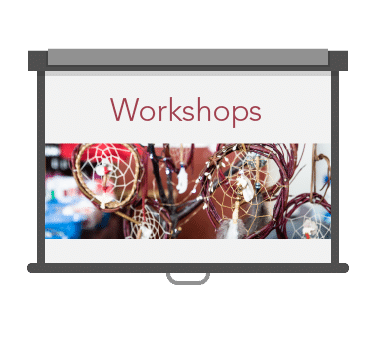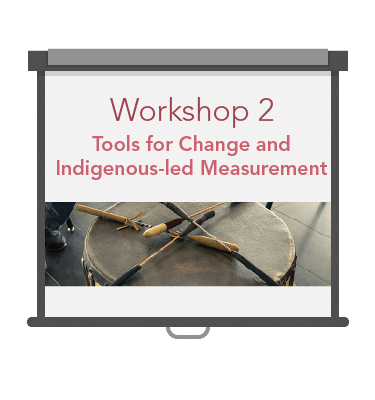Date: September 10 & 12, 2024
Time: 12:30 pm – 3:30 pm EST
Location: ONLINE
Workshops 1 & 2 Bundle
This is our bundle of Workshop 1: Wearing an Indigenous Evaluation Lens and Workshop 2: Tools for Change and Indigenous-led Measurement.
We are offering a limited number of coupons for customers who may be unable to apply for funding to cover this cost, such as students. Contact info@johnstonresearch.ca with the subject ‘Workshop Coupon’ and provide your name, affiliation, phone number, and date of the workshop for which you would like to attend to apply for a coupon.
Workshop 1: Wearing an Indigenous Evaluation Lens
Read more: Workshop 1: Wearing an Indigenous Evaluation Lens
Time for Change
Western approaches to evaluation have remained essentially static for decades. Further, they don’t reflect the realities of Indigenous culture and experience. It’s time to remove the barriers to Indigenous-led evaluation practices.
Embracing Reconciliation
Rather than divorcing entirely from Western practice, this course provides an exploratory path of reconciliation. You will learn to recognize the intersection between Indigenous cultural foundations and the current, widely practiced, Western approach to evaluation. Evaluation approaches are shaped by culture and experience. Hence, wearing an Indigenous Evaluation Lens is fundamentally different. In this workshop we will build confidence in understanding the theoretical underpinnings of evaluative thought from our own perspective, and from Indigenous ways of knowing and being.
Building a Theoretical Foundation For Indigenous-Led Evaluation
By examining your personal perspective, Western theory, and Indigenous cultural foundations, you will have the tools to build methodologies and identify appropriate indicators for Indigenous-led evaluations.
Workshop 2: Tools for Change and Indigenous-led Measurement
Read more: Workshop 2: Tools of Change and Indigenous-led Measurement
Tools for Change
Soft data-related tools can be used for assisting with movement; however many tools can stamp-out development. A proper set of instrumentations and measurement tools should focus on the documentation of relationships. Relationships are time-bound but not in the way that the-self can make any kind of changing alone; rather the relation of self is fully related to one’s out-outside world.
Nothing About Us, Without Us
In an Indigenous setting, dialogue is preferred over a rigid assessment. Paperwork is seen as a secondary measure, the first measure rests in a human to human dialogue process with substantial growth potential. The threat to evaluation is how these growth intervals can be measured. Institutions need to be careful they are not assessing individuals, individuals need the space to assess themselves, because only they know how best to conduct that measurement. Current evaluation practice dissects the self from the family and the community. The self is inseparable and asking Indigenous peoples to answer questions which are self-driven further damage their psyche and connections to the land and world around us.
Building-Up and Forward Movement
Poor education, poverty, inadequate housing, food insecurity and social isolation have been linked to long-term stress implicated in specific conditions such as cardiovascular disease, diabetes, mental-illness and suicide (Minore & Katt, 2007; White & Jodoin, 2007; Bombay, Matheson & Anisman, 2009; Mikkonen & Raphael, 2010). For example, a recent study finds that poverty (acute or long term) can impair one’s ability to make sound decisions (Mani, Mullainathan, Shafir & Zhao, 2013). Loppie, Reading and Wein (2009) point to a progressive nature in the perpetuation of the social determinants. For instance, poor housing is linked to domestic violence and injury.
A further layer of complexity in Indigenous evaluation are the difficulties associated with variability in the interpretation and definition of what seem to be basic and standardized terms through a Western perspective. Indigenous peoples view health as not merely the absence of disease, as is emphasized in bio-medical models, but as the balance and interconnectedness in health and well-being of spirit, mind, (emotion) and body with individual, (family), community and environment (Ootoova et al., 2001; Edge & McCallum, 2006).
This workshop provides you with a set of tools and methods which will change the way evaluation works. We will examine: 1) selecting the right indicators, 2) reasons why numbers should not drive decision-making, and 3) developing intervention-based tools.



